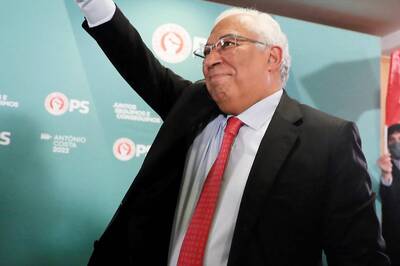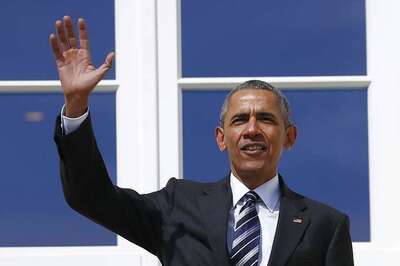
views
Rarely do critics and the jury at Cannes see eye to eye. In 2015, they did with Jacques Audiard's brilliant Dheepan -- trailing the journey of three Sri Lankan refugees as they make their way from strife and bloodshed in war-torn Sri Lanka to France. This time, Cannes Film Festival's top honour, Palm dÓr, went to South Korean director Bong Joon-ho's covert political drama, Parasite, also a critics' favourite.
This is the second consecutive year an Asian work is walking away with the Palm dÓr. Last year, Japan's exceptionally moving Shoplifters by Hirokazu Kore-eda earned this prestigious trophy from a festival that is often considered the queen of all.
Parasite is a ripping commentary on a deeply divided society -- where a chauffeur is ridiculed for his smelly clothes and made to feel like a worm. And in Parasite, such demeaning incidents lead to an unthinkable episode. The movie is a wild ride – where comedy rubs shoulders with tragedy, were laughter is punctuated by tears and a kind of desperation that pushes people to the dangerous edge.
Explaining the jury's collective enthusiasm for Parasite at the post-awards ceremony press conference, the president, Alejandro Gonzalez Inarritu, said: “We all shared the mystery of the unexpected way this film took us through different genres and spoke in a funny, humorous, tender way — with no judgment — of something so relevant and urgent, so global in such a local movie, with such a beautiful efficiency of media, and an understanding of what film really is. We were all fascinated when we saw it, and it kept growing and growing: that’s why it was a unanimous decision.”
French-Senegalese auteur Mati Diop clinched the Grand Prix for her debut feature, Atlantics. Diop, who made history as the first black female director in Competition, dramatises a refugee crisis seen through the eyes of a woman abandoned by her lover, who tries an illegal crossing. This is an angle seldom seen in cinema.
Describing Diop’s work as “a beautiful fable,” juror Elle Fanning said, “Though it deals with these issues, it also felt personal and vulnerable, very emotional and just quite precious.” The 21-year-old actress said her Cannes experience had made her “view cinema differently, and for the good.”
Contrary to expectations, the Best Actress Prize went to Britain's rising star, Emily Beecham – who plays a scientist in Jessica Hausner's Little Joe – a story about the adverse side effects of a genetically modified plant.
Most of us had thought that Debbie Honeywood, who essays the troubled wife, Abby, in Ken Loach's warm and touching Sorry, We Missed You, would catch the jury's eye.
Antonio Banderas – often seen as the Spanish giant Pedro Almodovar's alter-ego – won the Best Actor Palm for his subtly powerful role of an ageing movie director in Pain and Glory, said to be an autobiographical study of the helmer. Dedicating the award to Almodóvar, Banderas said, “People think we live in a red carpet, but it’s not true. We suffer a lot, we sacrifice, and there is a lot of pain behind an actor of any kind. But there is also glory, and this is my night of glory,” before promising, “The best is still to come.”
Presenting a tie for the Jury Prize — awarded to a pair of politically charged features, Ladj Ly’s Les Misérables and Kleber Mendonça Filho and Juliano Dornelles’ Bacurau — outspoken and radical filmmaker Michael Moore told the crowd, “Trump is the lie that enables more lying.”
Cannes most favourite auteurs, Jean-Pierre and Luc Dardenne — who have won the Palme d’Or twice before, as well as two other awards — clinched the Best Director Prize for “Young Ahmed,” the disturbing portrait of a Muslim teenager living in modern Belgium who tries killing his teacher after being indoctrinated with rebellious ideology by his imam.
French writer-director Céline Sciamma got the Screenplay Award for Portrait of a Lady on Fire, a lesbian period movie that explores female gaze.
Elia Suleiman’s It Must Be Heaven fetched him a Special Mention from the jury. A commentary on Palestine's troubles, his work was a rare comedy in this year's Competition.
Finally, contending that most of their chosen movies dealt with relevant sociopolitical themes, Inarritu felt: “Art can sometimes see the future… I think that now cinema has an urgency of social consciousness expressed by different people around the world...But we would not care about who directed, what country, what political message — that honestly should not matter as much as the film itself. Cinema has to speak by itself. These were cinematic decisions, not political agendas.”
Inarritu chaired a jury that included French author-artist-director Enki Bilal, French director Robin Campillo, Senegalese actress-director Maimouna N’Diaye, American actress Elle Fanning, Greek director Yorgos Lanthimos, Polish director Paweł Pawlikowski, American director Kelly Reichardt, and Italian director Alice Rohrwacher.
--
Here is a list of awards:
COMPETITION:
Palme d’Or: “Parasite,” Bong Joon-ho
Grand Prix: “Atlantics,” Mati Diop
Director: Jean-Pierre and Luc Dardenne, “Young Ahmed”
Actor: Antonio Banderas, “Pain and Glory”
Actress: Emily Beecham, “Little Joe”
Jury Prize — TIE: “Les Misérables,” Ladj Ly; “Bacurau,” Kleber Mendonça Filho and Juliano Dornelles
Screenplay: Céline Sciamma, “Portrait of a Lady on Fire”
Special Mention: “It Must Be Heaven,” Elia Suleiman
OTHER PRIZES:
Camera d’Or: “Our Mothers,” Cesar Diaz
Short Films Palme d’Or: “The Distance Between the Sky and Us,” Vasilis Kekatos
Short Films Special Mention: “Monster God,” Agustina San Martin
Golden Eye Documentary Prize: “For Sama”
Ecumenical Jury Prize: “Hidden Life,” Terrence Malick
Queer Palm: “Portrait of a Lady on Fire,” Céline Sciamma
A CERTAIN REGARD
Un Certain Regard Award: “The Invisible Life of Eurídice Gusmão,” Karim Aïnouz
Jury Prize: “Fire Will Come,” Oliver Laxe
Best Director: Kantemir Balagov, “Beanpole”
Best Performance: Chiara Mastroianni, “On a Magical Night”
Special Jury Prize: Albert Serra, “Liberté”
Special Jury Mention “Joan of Arc,” Bruno Dumont
Coup de Coeur Award: “A Brother’s Love,” Monia Chokri; “The Climb,” Michael Angelo Covino
(Author, commentator and movie critic Gautaman Bhaskaran has covered Cannes close to three decades)



















Comments
0 comment